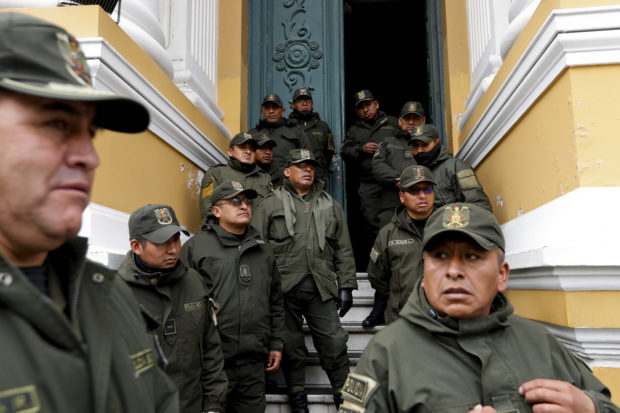WASHINGTON – Senior officials at the U.S. State Department said Monday the situation in Bolivia is not a coup, despite what some Latin American governments have claimed. They allege that the constitutional order in the Andean country will not be broken once an interim president calls for elections within 90 days.

Police guard Congress in La Paz, Bolivia, Monday, Nov. 11, 2019. Bolivian President Evo Morales’ Nov. 10 resignation, under mounting pressure from the military and the public after his re-election victory triggered weeks of fraud allegations and deadly demonstrations, leaves a power vacuum and a country torn by protests against and for his government. (AP Photo/Natacha Pisarenko)
Bolivia’s first indigenous president Evo Morales resigned Sunday after weeks of protests following a disputed election.
The U.S. officials said the Bolivian military merely pointed out the fact that public security had deteriorated by the time they asked Morales to resign. They spoke on condition of anonymity because they weren’t authorized to talk to reporters.
There were no immediate signs that the military itself was maneuvering for power, but Mexico, Uruguay, Cuba and Venezuela have said Morales was deposed illegally. Argentina President-elect Alberto Fernández joined that analysis.
U.S. Sen. Bernie Sanders of Vermont, a 2020 Democratic presidential candidate and self-described democratic socialist, also expressed worries about a possible coup.
“I am very concerned about what appears to be a coup in Bolivia, where the military, after weeks of political unrest, intervened to remove President Evo Morales,” Sanders tweeted Monday.
The Organization of American States has called an emergency meeting Tuesday afternoon to discuss the situation in Bolivia.
Luis Almagro, OAS secretary general, called on Monday for Bolivian members of Congress to hold a session as soon as possible in order to designate new authorities.
Morales’ vice president also resigned, as did the Senate president, who was next in line. The only other official listed by the constitution as a successor, the head of the lower house, had resigned earlier.
President Donald Trump said the U.S. applauds the Bolivian people for demanding freedom and the Bolivian military for abiding by its oath to protect Bolivia’s constitution.
Trump said Morales’ departure preserves democracy and paves the way for the Bolivian people to have their voices heard.
Trump also said the events in Bolivia send a strong signal to Venezuela and Nicaragua “that democracy and the will of the people will always prevail.”
He added: “We are now one step closer to a completely democratic, prosperous and free Western Hemisphere.”
The bilateral relationship suffered a major hit when Morales expelled the U.S. ambassador and U.S. Drug Enforcement Agency a decade ago, accusing them of intervening in internal affairs. /gsg